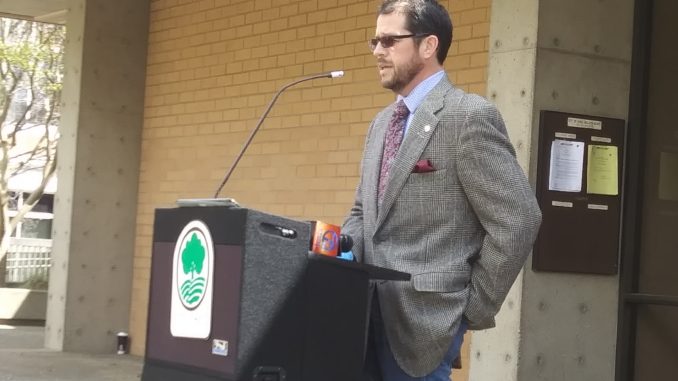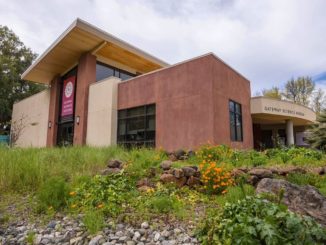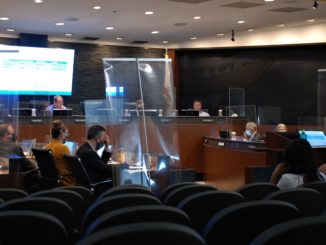
Like many other municipalities in California—and throughout the nation—the city of Chico held an emergency meeting this week to take steps to address the fallout from the novel coronavirus pandemic.
The agenda for the meeting on Wednesday (March 25) called for the council to adopt a resolution declaring a local emergency, giving City Manager Mark Orme leeway to quickly address related issues. Also included were several options to aid residents in the midst of this public health crisis with consequences never before seen in the modern era.
But first things first.
Overshadowing the meeting was an item brought forward by longtime Councilwoman Ann Schwab charging that Mayor Randall Stone’s leadership had “deteriorated to a level which hinders the city’s ability to operate smoothly and therefore constitutes its own emergency.”
The issue was moved to the fore of the meeting. As Schwab put it as she read a statement introducing the item from the dais: “We need a mayor who is fair, consistent and upholds the city agenda above their own.”
Schwab called for the panel to consider several steps, including removing him from the post and appointing a new mayor. That’s exactly what happened at the end of a more than hour-long discussion in which Stone went on defense and offense—first dismissing the efforts as politically driven and irresponsible in light of the pandemic, then attacking Schwab’s competency when the council weighed whether she ought to take the helm.
The vote was 4-3—with Stone, Councilman Karl Ory and Vice Mayor Alex Brown dissenting—to remove Stone from the post. The same three abstained during a roll call vote to appoint Schwab to the position. (Back in September, Stone narrowly escaped a similar effort to unseat him from the mayoral post.)
The backstory to the effort to demote Stone includes an interview he gave to Action News Now accusing one of his progressive council colleagues of partaking in a conservative-led campaign against a local needle-access program. In addition, he’d poked at the same group on social media—wholly sarcastically—by way of a comparison with a fictitious effort to stem the corononvirus.
What got lost in the drama was a substantive move to keep people housed during the crisis, as well as forward momentum on the idea of creating a designated camping area for the unhoused.
First up, the council voted in favor of enacting local tenant protections by prohibiting eviction proceedings in cases of financial hardship wrought by the coronavirus. More than a million Californians have filed unemployment claims this month as businesses have shuttered following Gov. Gavin Newsom’s statewide stay-at-home order, an effort to inhibit the spread of the disease.
City Attorney Andrew Jared explained that an executive order issued by Newsom earlier this month authorizes cities and counties to prohibit evictions. Under the provision, rent is deferred but not waived. Technically, it provides a delay period before landlords could seek an unlawful detainer—the mechanism for having people removed from their properties, Jared said.
“The idea is to give folks a breather to get back on their feet after they’re unable to work,” he said.
The panel fine-tuned the temporary restriction based on a provision approved in Sacramento. It requires that tenants notify their landlords in writing prior to the day rent is due and provide verifiable documentation of a financial hardship related to COVID-19.
Brown urged the panel to approve the moratorium. She noted that she’d already heard from residents who had lost work and were facing a difficult choice: either paying rent or buying food.
Stone echoed Brown.
“This is exactly what people need to keep them in their homes—to keep stabilizing this local economy, regional economy,” he said. “And this can give renters the surety that they’re being looked after in this coming incredible disaster.”
Pushback came from Councilman Sean Morgan. He cited a couple of clauses of the U.S. Constitution, including the Takings Clause, which refers to the government providing “just compensation” for public use of private property.
Ultimately, the council voted 4-2 to support the provision. Morgan and Councilwoman Kasey Reynolds dissented; Ory left the meeting following the mayoral drama. The item was included in the language of the least controversial item of the evening—adoption of the resolution declaring a local emergency, which, among other things, directs the city manager to cancel or postpone nonessential gatherings on city-owned properties.
The panel took up the discussion in the City Council chambers, but the arrangement was surreal. City leaders were spread at least 6 feet apart, which meant only four could be seated at the dais—the remaining three and staff were spread throughout the chambers, including in the gallery. Aside from local media, the public was prohibited from attending the meeting.
One of the other discussion points of the evening was Brown’s idea of establishing a legal campground for homeless people—both for tent and car camping.
She commended city staff for setting up hand-washing stations at public restrooms and cleaning them daily to mitigate the spread of the virus. However, she stated that she’s “scared and worried” about the pandemic reaching the vulnerable population and the subsequent burden on quarantine and medical facilities.
Long a proponent of a legal camping location, Councilman Scott Huber initially voiced concerns about bringing people into proximity of one another during this critical time. Brown responded that social distancing and other safety measures would need to be implemented.
In the end, the panel voted 5-1 to direct staff to research legal camping options on public and private property, potentially in partnership with county public health experts and local homeless service providers, and to explore additional ways to provide sanitation. In her motion, Brown emphasized the importance of accelerating the creation of emergency shelter options—a point Huber focused on as well.
“If we’re going to have the impact on keeping this population from getting sick, we need to do it ASAP,” he said.




Thank you for your reporting!
Keep it up!
Great to see your reporting. Btw, I was absent following directive that over 60 should not congregate.
Now where else are you going to get this level of intelligence, thoroughness, fairness, and in-depth writing in Chico? Nowhere. Support CN&R!
Thank you for this synopsis.
Thank you for taking the time to get all the information and report it. Glad to see you up and running!
Thank you.
Thank you for the great summary.
Thank you CN&R! We NEED you in our community!
Thank you CN&R. You have been and continue to be a real asset to this community.
We do indeed need you in our community!
Yes, thank you so much for your important work. How much would a subscription need to be to keep you running? We need your reporting.